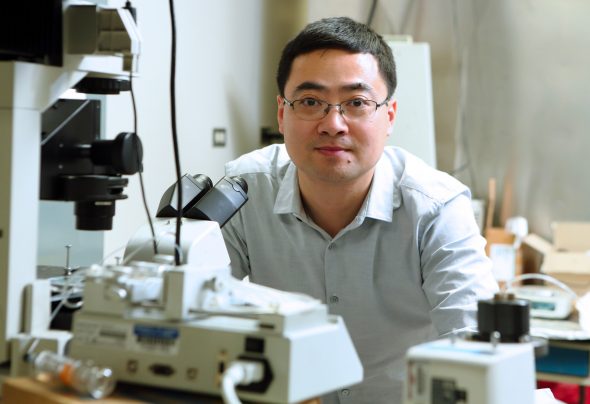2018 Researcher of the Year Jie Xu
Jie Xu
Rising Star
Natural Sciences and Engineering
Just as smartphones now have hundreds of functions, researcher Jie Xu wants to one day make a chip the size of a credit card capable of conducting full experiments.
How? Using microfluidics.
“We basically control fluids at a very small scale,” said Xu, assistant professor of mechanical and industrial engineering, explaining the topic of his research. That “very small scale” is as tiny as 100 micrometers, the thickness of a strand of human hair.
“We move things around in and with the liquid to do all kinds of tasks for us. For example, we can try to screen blood to find cancer cells, or we can detect toxins from food samples,” Xu said.
In his research, he manipulates these small fluids to impact everything from aerospace to health, and the recognition he and his Microfluidics Lab at UIC has received is overwhelming. Since joining UIC in 2014, his research has been supported by more than $1 million in awards.
One of his latest achievements is earning the prestigious NASA Early Career Faculty grant in 2017. Xu is using the grant to create miniature systems for easy fluidic sampling in space.
“It is extremely difficult for astronauts to do experiments in space,” said Xu, who listed the traditional materials used in labs, such as beakers. “So, what they want is a simple, compact device where they can push a button, and maybe it’ll say, ‘Life found!’ They don’t need to understand how the reagents are mixed, or how the proteins work. They want a black box, and we’re working on it, on the fluids that will flow inside that box to achieve desired functions.”
With funding from the National Science Foundation, Xu is trapping light in droplets to make breakthroughs for biosensors, devices that can test for the presence of chemicals faster than traditional methods.
UIC’s Office of the Vice Chancellor for Research granted one of Xu’s projects funding in 2018 to link damaged neurons and muscle cells with liquid metals, research that could, in theory, lead to a treatment for paralysis.
And many of his funded projects have started to produce some important results.
“Last year alone, I published 13 journal papers,” Xu said. “It’s been the most productive year in my entire career so far.”
But his other accolades are plenty. Xu has received the College of Engineering’s 2018 Research Award for outstanding contributions to research. He was also a 2016 Lab on a Chip Emerging Investigator, an honor which celebrates the most promising and brightest young scientists practicing miniaturization. In 2013, he became an elected member of the Global Young Academy, which honors outstanding early career scientists from around the world.
When asked why he decided to pursue this research, he said first, because the topic is interesting, and second, because of what he gets to see under the microscope.
“It’s beautiful,” said Xu. “It’s fun to just see [the fluids], see the flow that circulates or watch them bump into each other, and it’s just so powerful because we can use a small droplet to control reactions or cells. With these, a lot of good things can happen.”

